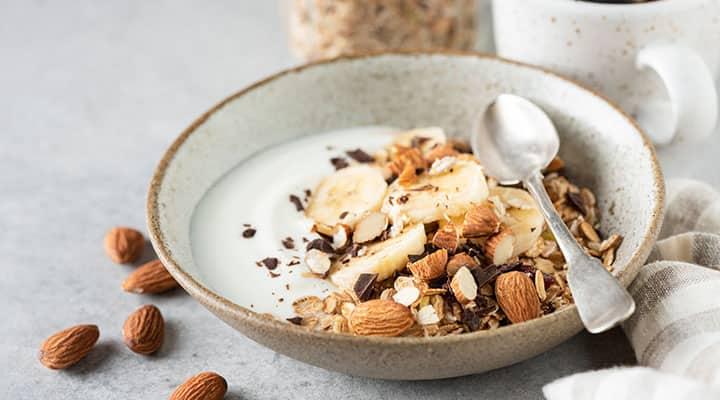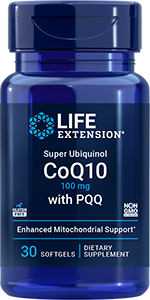
Magnesium and Potassium Supplements: Should You Take Them Together?
Published: October 2023
You've probably heard of magnesium and potassium—and you may know that they each benefit your health in significant ways. But did you know they are quite the power couple? These supplements work together in a lot of ways—they're sometimes even referred to as sisters!—especially when it comes to supporting already-healthy blood pressure.
Here's how each of these minerals work, what they do for the body, and why they are a dream team for heart health.
What are potassium and magnesium supplements?
If you've ever looked at a nutrition label, you've likely seen things like calcium, potassium, sodium, magnesium and even more listed—words that bring to mind the periodic table of the elements from your seventh grade science class. But have you ever given a thought to what those names mean and what they can do for your body? These micronutrients are called minerals. There are several different types of minerals found in the human body, and each one of them wears a different hat to keep you functioning at your best.
Just like it's important to get enough of the right vitamins, getting minerals in your diet isn't just important, it's necessary. Minerals play a role as helper molecules, which in simpler terms, just means that they help enzymes or other reactions in your body support a variety of functions essential to lasting health.
Topping the list of major minerals are potassium and magnesium, and their benefits both alone and together really stand out from the crowd.
What are the benefits of taking magnesium and potassium supplements?
As we covered, these minerals are an important part of supporting your overall well-being. Most of the magnesium in the body is found in our bones, soft tissues and cells, and most of the potassium in the body is found in our cells. Maintaining healthy amounts of each supports your health in a wide array of ways.
Benefits of magnesium
Magnesium sure is a mighty mineral! Here's why:
- Heart health—Take heart in the fact that magnesium is a superstar for your cardiovascular health! It stands out in particular for its ability to inhibit inflammation to promote arterial health, and also supports already-healthy blood pressure levels. It achieves this by helping relax the smooth muscles in your blood vessels so your heart continues to pump efficiently. Its ability to transport potassium and calcium also positively impacts healthy heart rhythms.
- Bone health—Calcium isn't the only mineral that keeps your bones healthy! Because so much of your body's magnesium is stored in the bones, it helps maintain healthy bone mineral density in both men and women. It's also involved in the activity of cells involved in bone building.
- Muscle health—Among the 300+ biochemical reactions that magnesium helps support, muscle function is among them. The role it plays in the active transport of calcium and potassium ions across cells is also an important process for muscle contraction.
Magnesium's benefits go beyond these! Different forms of magnesium can also support metabolic, brain, immune health and more.
Common forms of magnesium include glycinate, oxide, gluconate, threonate, citrate and more. If you're looking for immediate- and extend-release magnesium, the combination of magnesium citrate and magnesium oxide can help support immediate and prolonged absorption into the body so you can get the most out of each of these forms.
Benefits of potassium
So what about potassium? You'll see that some of its roles complement what magnesium and other minerals do for the body:
- Supports healthy blood flow—Potassium supports the process of vasodilation, which just means it helps with blood vessel expansion. This in turn helps with healthy blood flow, key to keeping your heart healthy. To sweeten the pot even more, potassium also supports a steady heartbeat!
- Involved in several of the same processes as magnesium—Remember how magnesium is involved in 300+ processes in the body? Turns out that potassium is involved in many of the same processes! This makes it easier for both supplements to work together when it comes to keeping you healthy.
- Helps remove sodium from the body—Potassium acts as a counterbalance to sodium and helps support the process of filtering it out of the body through urine. The more of this nutrient you have, the more sodium you can filter out through your regular intake. This in turn supports healthy blood pressure levels.
Much like magnesium, there are many forms of potassium. Some common forms include citrate, phosphate, aspartate, bicarbonate and gluconate. The potassium chloride form, however, is one of the most common forms found in supplements. This makes it a good form of potassium to take alongside an extend-release magnesium to really get the most of these "sister" minerals' benefits.
Explore Our Best Heart Health Supplements
Can you take potassium and magnesium together?
Simply put, yes! You definitely can (and probably should) take both of these together, whether in your diet or in supplement form. Studies have even found that together, the magnesium-potassium combination provides powerful support for cardiovascular health, especially when it comes to healthy blood pressure support.
How to get more magnesium and potassium in your diet
If you're simply looking to add more of the magnesium-potassium combo to your diet, the obvious answer might be to get it through the mineral-rich foods you eat.
Bad news: sports drinks supplying these essential minerals in the form of electrolytes likely won't give you everything you need to maintain optimal levels of either of these nutrients. With an RDA between 2,600 and 3,400 mg for potassium and 310-420 mg for magnesium, including both in a healthy diet should be a priority.
Good sources of magnesium include dark leafy green vegetables, nuts, seeds, whole grains and legumes. Some particularly magnesium-rich sources include:
- Fruits (apricots and bananas)
- Lentils
- Squashes
- Nuts (Brazil nuts, cashews and peanuts)
- Potatoes
When it comes to potassium, bananas aren't the only way you reap the benefits! Some of the best sources of potassium include:
- Seeds (chia and pumpkin)
- Nuts (almonds, cashews and peanuts)
- Dark leafy greens like spinach
- Black beans
While there are plenty of these minerals to be found in food, it is important to also be aware that soil quality over the years has been reduced, contributing to things like magnesium scarcity, which means that less and less of these minerals can be found in soil where foods grow. With that in mind, if you're struggling to get enough of either of these nutrients through a balanced diet alone, a dual-action dietary supplement might be a good option to reap the benefits of a potassium-magnesium combo and meet your body's needs.
Pro tip: You can likely find a potassium-magnesium combination as a part of a multivitamin formula, but if you want to get either of these in high doses (or higher than what your multi can provide), a targeted supplement is probably a better fit for your needs.
How to take potassium and magnesium supplements
As is the case with most supplements, you want to carefully read the instructions on the label when you are taking mineral supplements like magnesium and potassium. If you have any questions about supplementing or aren't sure if you may experience potential interactions, it would be wise to discuss supplementation with your primary care provider.
Make sure supplements aren't the only thing you're doing to support a heart-healthy lifestyle. Get enough sleep, eat a balanced diet and exercise regularly, and make sure that you're regularly checking your numbers through lab testing.
Still not sure what you need? Take our blood pressure support quiz to see which supplements are best for you!
References
- Bardhi O, et al. "The Role of Dietary Potassium in the Cardiovascular Protective Effects of Plant-Based Diets." Semin Nephrol. August 2023. https://pubmed.ncbi.nlm.nih.gov/37544060/
- D'Elia L, et al. "Effect of Potassium Supplementation on Endothelial Function: A Systematic Review and Meta-Analysis of Intervention Studies." Nutrients. February 2023. https://pubmed.ncbi.nlm.nih.gov/36839211/
- Fritzen R, et al. "Magnesium Deficiency and Cardiometabolic Disease." Nutrients. May 2023. https://www.ncbi.nlm.nih.gov/pmc/articles/PMC10222666/
- Groenendijk I, et al. "Impact of magnesium on bone health in older adults: A systematic review and meta-analysis." Bone. January 2022. https://pubmed.ncbi.nlm.nih.gov/34666201/
- Pickering RT, et al. "Higher Intakes of Potassium and Magnesium, but Not Lower Sodium, Reduce Cardiovascular Risk in the Framingham Offspring Study." Nutrients. January 2021. https://pubmed.ncbi.nlm.nih.gov/33477824/
- "How Potassium Can Help Control High Blood Pressure." Heart.org. June 2023. https://www.heart.org/en/health-topics/high-blood-pressure/changes-you-can-make-to-manage-high-blood-pressure/how-potassium-can-help-control-high-blood-pressure
- "Magnesium." Harvard T.H. Chan School of Public Health. March 2023. https://www.hsph.harvard.edu/nutritionsource/magnesium/
- "Magnesium." National Institutes of Health. June 2022. https://ods.od.nih.gov/factsheets/Magnesium-HealthProfessional
- "Potassium." National Institutes of Health. June 2022. https://ods.od.nih.gov/factsheets/Potassium-HealthProfessional
Always be in the know!
Access the latest deals, wellness news, expert health tips & more!










